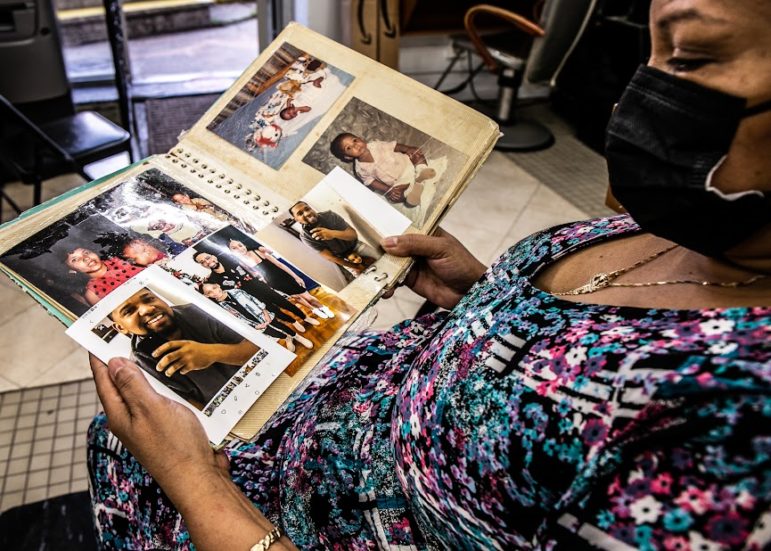Advocates and progressive lawmakers have slammed the moves for a lack of transparency and for further separating detainees from their communities, families, and attorneys. Meanwhile, about 20 detainees who remained at the New York jail were moved to another unit within the facility, which uses a different communications system that has made it harder for them to stay in touch with their attorneys, detainees and their lawyers told City Limits.

Adi Talwar
“The transfer has destroyed us,” said a mother whose son, in ICE detention for the last two years, was abruptly transferred from the Orange County Jail to a facility in Mississippi this summer.
Without warning in July, more than 60 Immigration and Customs Enforcement (ICE) detainees held at New York’s Orange County Correctional Facility (OCCF) were transferred to other facilities, some as far away as Mississippi and others to the Batavia Federal Detention Facility further north in Buffalo, NY.
Advocates and progressive lawmakers have slammed the moves for a lack of transparency and for further separating detainees from their communities, families, and attorneys. Meanwhile, about 20 detainees who remained behind at OCCF were moved to another unit within the New York jail, which uses a different communications system that has made it harder for them to stay in touch with their attorneys, detainees and their lawyers told City Limits.
The challenges are the latest in an ongoing controversy over ICE detention at OCCF, which in the last year has come under scrutiny over COVID-19 precautions as well as allegations of abuse and discrimination that led to the transfer of two correction officers. Detainees staged a hunger strike in February, prompting a NYC Council immigration committee hearing later that month focused on conditions at the jail, and a visit by Councilmembers and advocates in May.
A spokesperson for the Orange County Sheriff’s Office declined to comment for this story, leaving unanswered several other issues City Limits asked. The office has previously denied the allegations.
For years, advocates and lawmakers have pushed for New York state to end its existing contracts with ICE, after seeing neighboring New Jersey pass a similar ban in 2021. Many detainees held in New Jersey jails were moved to OCCF at the time.
The summer transfers of detainees out of Orange County Jail prompted questions about the future of the site’s relationship with ICE. In May, ICE reported that a total of 131 detainees were held at the facility in Goshen, NY; just 69 incarcerated immigrants remained after the July moves. As of Sept. 16, 53 people were in ICE custody at the facility, according to ICE.
“It has been unclear whether OCCF has decided against renewing its contract with ICE or if ICE is unilaterally phasing out its contract with OCCF,” Congressmembers Alexandria Ocasio-Cortez and Jamaal Bowman wrote in an August letter to the agency requesting more information for the sake of those being held there. “We would hope the agency would follow its own appropriate procedures in alignment with human dignity, respect, and out of consideration for the human impact of their policy decisions.”
When asked, an ICE spokesperson said that there are no updates with the jail’s contract. “The OCCF contract with ICE has not changed,” the spokesperson told City Limits.
Two communication systems under one roof
The day after dozens were transferred out of OCCF this summer, some of the remaining detainees were relocated to other cells within the jail, and about 20 were moved to a section known as the Delta 1 unit, where both lawyers and their clients have reported communications problems and difficulties in making calls to advance their immigration cases.
The Delta 1 unit uses different telecommunications software than what was available in detainees’ prior location in the facility, where they used a private video conferencing system by correctional technology company GTL. An ICE spokesperson confirmed to City Limits that the cavernous Delta 1 unit does not have the same system, which attorneys used to video chat with their clients, instead utilizing another program via computer tablets.
The previous method “is older technology that has gone past its anticipated life span and is rapidly becoming obsolete,” an ICE spokesperson said, saying it is being replaced by a communication app called Getting Out. But attorneys claim that calls via the new system are more costly for both lawyers and detainees, as well as more difficult to use.
“[None] of our attorneys has been able to register,” as a professional user with the new program, Sophie Dalsimer, an immigration supervising attorney at Brooklyn Defender Services told City Limits on Sept. 16, nearly two months after detainees were moved to Delta 1. The organization is one of the three immigration advocacy groups from the New York Family Immigrant Unity Project (NYIFUP), which represents immigrants facing deportation.
Another NYIFUP provider, Legal Aid Society, said that only a couple of their attorneys have been able to register in the application as professional users, but none of them quote knew how they managed to do so. ICE said its staff provides instructions for how to register to any attorney that runs into problems, but both Dalsimer and Allison Wilkinson of the Legal Aid Society say they’ve gotten the runaround, with ICE referring them to its IT office, which in turn refers them to OCCF, only to have the jail tell them to contact ICE.
The attorneys added that they can only make 30-minute calls with the tablet system, saying they were offered more time with the old software. “Here, there is no connection, there is no computer. No video call,” said one of the detainees struggling with the new system. “I have not been able to speak to my attorney.”
Now detainees have to initiate the call. Moreover, said Wilkinson, both parties must have monetary credit in their accounts to receive and send text messages, so coordinating a single appointment has become very difficult: The lawyers are charged to send a text message, the detainee must have money in their commissary account in order to open it, and vice versa.
In a statement, an ICE spokesperson said the agency “considers access to legal counsel and representatives a top priority.” “Leadership at every level has and continues to work with facilities nationwide to accommodate legal visitation to the maximum extent possible and in the safest manner,” the spokesperson said.
Detainees told City Limits that the Delta unit had not been in use for months before they were moved there, and is more restrictive than where they were previously held. “There is no yard, no kitchen,” a detainee said. Another detainee, who didn’t want to be identified by name, said the water came out of his tap dark and appeared dirty. It made him feel sick, he said, causing him heartburn and acidity in his stomach.
ICE denied that there were any issues with the water quality in OCCF. “Potable water is supplied to the Orange County Jail Water System by the Village of Florida, New York,” an ICE spokesperson said. “It is a public water system tested monthly by the New York State Department of Health—Bureau of Water Supply Protection. During its April 2022 inspection, OCCF met the standard.”

Councilmember Shekar Krishnan
The Orange County Jail in Goshen, NY
The book that never arrived
Communication has gotten tougher, too, for some of the former OCCF detainees transferred to facilities further away.
Among those sent to Adams County Correctional Center in Natchez, Mississippi, was a man whose children, wife and parents live in New York, and the transfer to a southern state thousands of miles away has altered their relationship.
“It was arbitrary,” the man’s mother told City Limits of the lack of notice and the way the transfer was carried out. The man’s Brooklyn Defender Services lawyer was also not informed of the move, she said. “I know there are rules that have to be followed, but it’s not justified for someone who lives here—with his family—to be sent to Mississippi,” the man’s mother said.
It took several days for the man’s family and lawyer to confirm the transfer and his new location. Two months later, not being able to visit him is still hard to digest for his family.
His mother, who works in The Bronx, explained that her son has been detained for almost two years. Since then, she and her husband have been working harder than usual to send money to his commissary account.
“About the food, he tells me that it is not good food, that it is not enough: that it is food for pigs,” she said. Even sending him supplies is more complicated since the move, she added.
“He told me one day that ‘I’m going crazy, send me something to read,’” she explained between sobs. She ordered him a book, but officials at the facility tore the covers off because they were too thick, she said, and in the end they decided not to give it to him.
“The transfer has destroyed us,” the mother said. “What I would like is for him to be released, to see if we can recover.”









One thought on “Communication Issues at NY Jail After Transfer Of ICE Detainees”
i would love to donate a large amount of money to detainees to help them along and their families.